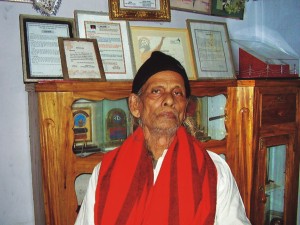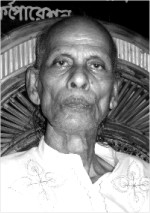| Cover Story
From Sylhet
A Tribute to Shah Abdul Karim
Iqbal Siddiquee
 The man cannot sing nowadays because of his large throat. At the twilight years of his life, he finds it hard to even speak. To make some noise, disciples and well-wishers of the aging artiste organized a colorful cultural function at the green field at his village of Ujan Dhol last year. Several thousand people, writers, poets, artistes and political leaders thronged the venue to pay heartiest greetings to the beloved personality that day. The Karim Loka Uthsab (Karim Folk Festival) was inaugurated by releasing pigeons. The man cannot sing nowadays because of his large throat. At the twilight years of his life, he finds it hard to even speak. To make some noise, disciples and well-wishers of the aging artiste organized a colorful cultural function at the green field at his village of Ujan Dhol last year. Several thousand people, writers, poets, artistes and political leaders thronged the venue to pay heartiest greetings to the beloved personality that day. The Karim Loka Uthsab (Karim Folk Festival) was inaugurated by releasing pigeons.
Shah Abdul Karim has been affecting people with music since his boyhood. He performed during the Language Movement in 1952, during the Jukta Front election in 1954, during the Kagmari Shammelon in 1957, Liberation War in 1971 and the anti -autocratic movement in 1990.
Shah Abdul Karim is a name well known to people, young and old, living in the Sylhet region as well as in the other parts of the country. He is about 90 years old, and now, this aging singer is almost bedridden. A devoted soul, the man has been part of the field of folk and mystic songs from a very early age. The composer and singer of many popular songs and sentimental favorites throughout the country has been suffering from old age ailments for years and staying at his remote village cottage in the Derai upazilla of
Sunamganj. Most of the current Baul singers from the region are his disciples.
 He is not certain of his date of birth. However, it is most likely that he was born about 90 years ago in the month of Falgun. Born in a poor family of a village, Shah Abdul Karim dove into songs and music from childhood. His parents Ibrahim Ali and mother Naiorjan Bibi did not oppose his decision, although the then Muslim society did not readily accept a musical lifestyle very easily. He is not certain of his date of birth. However, it is most likely that he was born about 90 years ago in the month of Falgun. Born in a poor family of a village, Shah Abdul Karim dove into songs and music from childhood. His parents Ibrahim Ali and mother Naiorjan Bibi did not oppose his decision, although the then Muslim society did not readily accept a musical lifestyle very easily.
Traditional schooling could not keep him engaged for long. Shah Karim's father sent him to a night school, meant for students of all ages at a backwater village. But that also failed to contain the boy. After just seven days, Karim left that school because of his compulsion to engage in folk music. However, soon he began doing the job of cow grazing at a household and in the evening, started joining the ashars of folk songs in the village. The Baul songs in particular captured him. Noticing his great interest in the mystical songs, Baul Komor Uddin, who also hailed from the same village, took Shah Karim in his group. This was Shah Karim's foot in the door. Later, he went under the discipleship of Rashid Uddin.
When the anti-British movement gained momentum, Karim was a boy of 15. He traveled with an Ektara from village to village in order to call the people to the cause of freeing the soil from the clutches of the British Raj. He composed some popular songs,
which brought him closer to the common men at that time.
Even in recent times a good number of songs have enjoyed popularity in the country, although there are many who have not even heard of the man. Some of his popular numbers are, “Agey Ki Sundar din Kataitam”, “Gramer Naojoan”, “Hindu Mussalman”, “Bandhey Maya Lagaichhey”, “Piriti Shikhaichhey”, “Tomra Kunjo Sajao Go”, “Aj Amar Prannonath Ashibey”, “Gari Choley Na Choley Na”, and many more numbers.
The river Kalni, which flows in front of the small village Ujan Dhol has influenced Shah Karim's life seriously since his childhood.
A yearly fair in the Bengali month of Falgun named 'Dhol Mela' also gave Karim an opportunity every year to participate in weeklong cultural functions performing Murshidi songs and Pala songs. Shah Karim, was in fact, the star attraction of the Dhol Mela.
 Shah Karim, however, never really had the acumen for making money, nor did he seem particularly interested. Staying home was rare for Karim, who traveled from one village to another performing. He was always on the move. His family, however, arranged a wedding for him, as they were interesting in seeing him be a family man. He consented and got married to Aftabunnesa Sarola. After the sudden death of Sarola the grief stricken Shah Karim composed some songs in her memory. He buried Sarola in the premises of the house. Their only son is Shah Nur Jalal. Shah Karim, however, never really had the acumen for making money, nor did he seem particularly interested. Staying home was rare for Karim, who traveled from one village to another performing. He was always on the move. His family, however, arranged a wedding for him, as they were interesting in seeing him be a family man. He consented and got married to Aftabunnesa Sarola. After the sudden death of Sarola the grief stricken Shah Karim composed some songs in her memory. He buried Sarola in the premises of the house. Their only son is Shah Nur Jalal.
The singer used to be a part of programs on Bangladesh Betar, Sylhet station in the early part of his career. It gave him good publicity in the region. He visited the UK in 1964 for the first time, and performed there. In 1985 he went there again as a team leader of eight folk singers from the Sylhet region. Shah Karim still remembers the Kagmari Shammelon of 1957, in which he had the scope to join the cultural function under Kabial Ramesh Shil.
Shah Karim bid a farewell to performing at a function at the upazilla headquarters of Derai last year. It was his last performance, due to his physical condition. His health is frail, but he is still drawn to the river Kalni. In the past, whenever he got some free time, Karim used to go to the riverbank for a walk. But, very recently he's been unable to do that. Most of his day is spent in bed.
Different organizations have awarded Shah Abdul Karim with medals and honors. In 2005, he was honored with the Prothom Alo-Meril Ajibon Shommanona Podok.
Karim has managed to oversee the completion of a small structure to start an institution for teaching Baul Sangeet, it is to be called the Abdul Karim Sangeetaloy. He started it 4 years back and got only Taka. 50,000 from the Council for his project. He believes, his long cherished dream will be realized one day. “Maybe one day”, said the musician, “one day when I am no longer alive.”
Copyright
(R) thedailystar.net 2007 |
